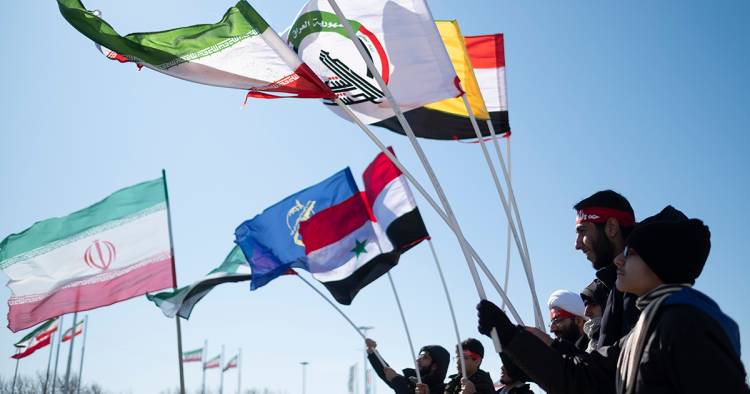Unpacking the complexities of Middle Eastern politics and society

Stay tuned with 24 News HD Android App

Israel's expansionist policy, known as the "Greater Israel" plan, has led to decades of conflict and humanitarian crises in the Middle East. This plan, which dates back to the early 20th century, aims to create a Jewish state stretching from the Nile Valley to the Euphrates River, encompassing parts of Lebanon, Jordan, Syria, and Iraq.
The implementation of this plan has resulted in the displacement and suffering of millions of Palestinians, as well as the destruction of infrastructure and economies in countries such as Lebanon and Syria. The Israeli government's actions have been widely condemned by the international community, with many accusing Israel of violating international law and committing human rights abuses.
Despite efforts by the international community to broker peace agreements and ceasefires, Israel's aggression has continued unabated. The country's leaders have shown little regard for human rights or international law, and have instead pursued a policy of expansionism and militarism.
The situation is further complicated by the involvement of other regional actors, including Iran, which has been accused of providing military support to militant groups in the region. The conflict between Israel and Iran has the potential to escalate into a wider regional war, with devastating consequences for the people of the Middle East.
In conclusion, the "Greater Israel" plan is a highly contentious and destructive policy that has led to immense human suffering and regional instability. It is imperative that the international community takes decisive action to hold Israel accountable for its actions and to work towards a just and lasting peace in the Middle East.
The United States has consistently hindered peace efforts in the Middle East, prioritizing its own interests over regional stability. Whenever cease-fire efforts emerge, the US intervenes, effectively fueling the conflict. This approach allows the US to maintain its influence in the region.
Iran is a prime target of Israel's operations in the Middle East, facing direct and indirect attacks. In response, Iran has adopted a strategic approach, delivering blunt responses to Israeli operations. The escalating tensions pose a significant threat, as Israel aims to expand the conflict to Iran, potentially sparking a global war.
The ongoing tensions in Gaza, Lebanon, and Syria are pushing Israel closer to its objectives. Meanwhile, Muslim countries have failed to move beyond rhetoric, hesitant to take concrete actions or directly engage in the conflict. Their reluctance emboldens Israel, allowing it to persist in its aggressive actions.
The situation in Syria is becoming increasingly complex following the end of the Alavi family and Bashar al-Assad regime. A crucial question remains: which forces drove this revolution? The United States appears to be the primary beneficiary of the current situation, with its interests no longer concealed. Notably, the US operates its largest air base in Syria.
Israel has also significantly gained from the revolution, occupying the buffer zone along the Quneitra province border. This strategic location enables Israel to target Damascus, merely 40 kilometers away, using artillery and maintain surveillance over the entire area. It's anticipated that the revolution's stronghold in Syria will be breached within the next few years.
The Iran-Israel tension has been escalating, and many experts believe that it's pushing the region towards a global war. The European Union is considering strict sanctions against Iran, while a recent poll showed that 62% of Americans and 74% of Israelis support military intervention to prevent Iran from developing a nuclear bomb.
The US has been increasing its military presence in the region, surrounding Iran from all sides. US Navy fleets equipped with fighter jets and cruise missiles are patrolling the Gulf waters, while Iran has been preparing its defenses, establishing air defense systems in key areas and moving sensitive nuclear facilities underground.
Despite these preparations, experts believe that the US has the capability to destroy dozens of Iran's nuclear facilities. The situation is further complicated by the involvement of other regional actors, including Israel, which has been conducting covert operations against Iranian targets.
The conflict between Israel and Iran has been ongoing for decades, with roots tracing back to the 1979 Iranian Revolution. Iran's nuclear program has been a major point of contention, with Israel and the US accusing Iran of pursuing nuclear weapons.
The United States' role in the Middle East has long been a subject of controversy and suspicion. Its actions in Afghanistan and Iraq are well-documented, and many believe that the US has fueled conflicts in the region to serve its own interests.
The situation in Syria is a prime example. The US has been accused of supporting regime change and fueling instability in the country, which has had far-reaching consequences for the entire Middle East. The future of Syria remains uncertain, and it's unclear how the new government will balance the competing interests of regional and international powers.
The Middle East is indeed a powder keg, with the Palestinians in Gaza facing immense hardship, and the situations in Lebanon and Syria remaining volatile. The Iran-Israel conflict and America's interests in the region have caused irreparable damage, and many fear that the situation could escalate into a global conflict.
It's worth noting that the US has a long history of involvement in the Middle East, dating back to the early 20th century. The US has consistently prioritized its own interests in the region, often at the expense of local populations and governments.
